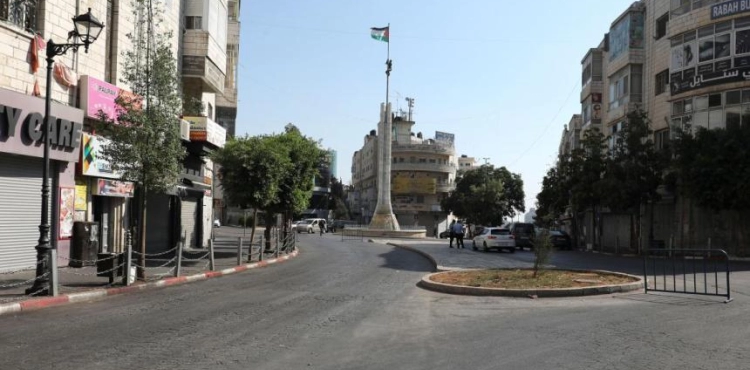The extension of the closure period in the Palestinian territories in light of the increase in the number of new infections of the Corona virus, is an additional burden for Palestinians who are already suffering from poor economic and living conditions.
The Palestinian territories are witnessing an increase in the number of injuries, especially in the West Bank, which recorded 6,992 injuries, including 43 deaths, prompting the Palestinian Authority to extend the closure of Palestinian cities for an additional four days. And imposing a curfew at night in various Palestinian cities for a period of two weeks.
The authorities have closed the provinces and imposed curfews for five weeks, since March 5th, after the first outbreaks of the emerging Corona virus appeared.
Immediately after the announcement of the new measures on Sunday evening, merchants protested and many of them took to the streets of the cities of Hebron, Ramallah and Nablus, demanding the cessation of closures and allowing the opening of shops so that they could secure a livelihood. The authority was forced to allow the opening of small shops in cities, stressing the need to adhere to preventive measures, and to put gags and spacing.
"Whoever tells people to stay in your homes must pay them the price of their livelihood," said Muhammad Nasr, who owns a grocery store in the center of Ramallah.
He added, "We are not only demanding the opening of commercial stores, we are asking for the return of life to normal and the return of transportation, because the shops do not work if there are no customers."
"We are facing a real health threat that requires solidarity and synergy to reduce the epidemic, which is beginning to take an upward trend," Palestinian government spokesman Ibrahim Melhem said, stressing that "the government is carrying out major tasks to address the epidemic despite the scarcity of possibilities ... despite political and economic challenges."
For its part, the Palestinian Authority is also experiencing financial hardship and has not been able to pay the salaries of its employees, who number about 177,000 in full, and have only spent 50% of their salaries for the past two months.
"The economic worker is a pressing factor on the Palestinian government, which cannot work like other governments in the world, and therefore it cannot impose decisions on its citizens without alternatives and solutions," economic analyst Nasr Abdel Karim told the agency.
"The authority cannot impose its vision to confront the epidemic," he added.
And he points out that "all government revenues are declining at a time when its expenditures rise in the face of corona, and what the Authority can get over the course of one month amounts to only about 300 million shekels (less than a hundred million dollars), and this amount does not cover salaries."
The monthly salary of the employees of the Palestinian Authority is estimated at 750 million shekels, or about 210 million dollars.
The revenue of the Palestinian Authority, which is estimated at about $ 350 million a month, declined a lot after its decision to refuse to receive the clearing tax that the Israeli Finance Ministry collects for its benefit in exchange for commercial transactions, which is estimated at $ 200 million per month.
The refusal came after the Palestinian Authority decided last May to stop dealing with agreements and understandings with the Israeli side, against the background of Israel´s intention to annex large parts of the occupied West Bank.
The percentage of taxes that you collect from merchants and from monthly administrative transactions decreased due to the closure.
The World Bank warned in the beginning of June that the poverty rate in the West Bank (14 percent) could rise twice as much due to the epidemic.
While economists assume that the Palestinian Authority, under pressure from the pandemic repercussions of Covid 19, may recalculate its calculations regarding its relationship with Israel, especially with regard to the clearing tax, politicians believe that this option is not on the table at all.
"I think the Palestinian Authority prefers a self-meltdown rather than returning to its understandings with Israel under the pressure of economic pressure," political analyst Abdel Majeed Sweilem told AFP.
He adds, "The Palestinian case is very confusing, as the confrontation of the Corona virus comes at a critical moment, which consists in the disengagement from the occupation and the rejection of the annexation plan, in addition to the absence of the Palestinian case."
But he stresses at the same time that it is not possible to "separate what is going on in the Palestinian territories from the political and economic crisis taking place inside Israel because of the Koruna as well."
And there is an increase in the number of new cases of Coronavirus in Israel, which led the Israeli Prime Minister Benjamin Netanyahu to pledge to disburse aid to the Israelis affected by the closure.
In terms of facing the outbreak of the virus, the Palestinian Authority also finds itself in a position of inability to move security in areas under Israeli security control, after its decision to stop security coordination with Israel.
Palestinian Prime Minister Muhammad Shtayyeh said more than once that the inability of the Palestinian Authority to operate in these areas is one of the reasons for the spread of the virus.
The Palestinian Authority has replaced its military presence in these areas with individuals in civilian clothes who have erected security barriers to search for people living with HIV.












